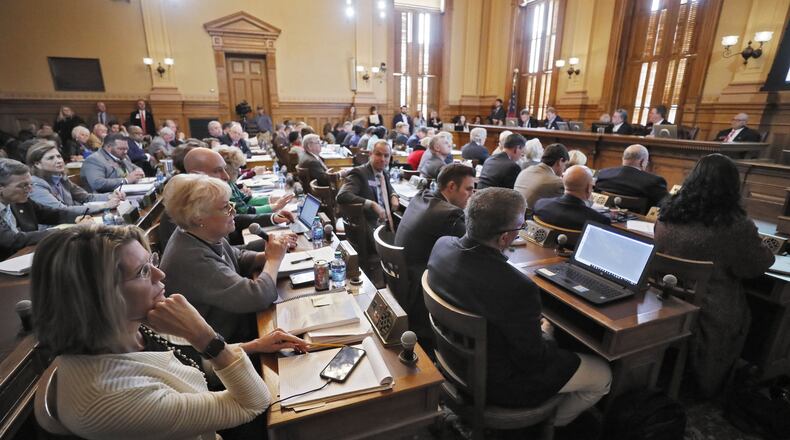Legislative leaders wondering whether the state can afford Gov. Brian Kemp’s proposals for a $3,000 teacher pay raise, $150 million for a new voting system and record overall spending during the upcoming year got some assurances Tuesday from Georgia’s fiscal economist.
Kenneth Heaghney, the head of Georgia State University’s Fiscal Research Center, told lawmakers that the state’s economy continues to grow, despite a few signs of problems nationally and internationally.
“What we expect is growth to continue but begin to slow,” Heaghney told lawmakers. “That’s what we expect to happen in the U.S. and in Georgia. My takeaway is an economic outlook that is quite positive but slowing.”
With talk of a coming recession heating up in recent months, the economist’s forecast is relatively good news for members of the state House and Senate Appropriations committees, which opened hearings Tuesday on Kemp’s record $27.5 billion state budget proposal.
The governor last week recommended about $600 million in raises — $3,000 for each teacher and 2 percent for state employees. The aim is to help the state retain teachers and state workers, many of whom have seen little in the way of increases in recent years.
Much of the rest of the increase in the budget for fiscal 2020, which begins July 1, would go toward keeping up with growing costs for public education and health care programs.
The governor also proposed more than $1 billion in borrowing, including $150 million to replace the state's aging voting system, a hot topic during last year's election campaigns.
Heaghney told lawmakers the state would need a little more than 3 percent growth in revenue in the upcoming budget year to pay for its spending. That’s below tax collections in 2018 and where collections have been so far in fiscal 2019.
He said the state has about $2.5 billion in reserves, up from about $100 million in 2010, when Georgia was feeling the impact of the Great Recession. Those reserves give Georgia a cushion when another downturn comes.
“Unfortunately, we don’t know exactly when that will come, but it will come,” Heaghney said. “We are as well prepared as we could be.”
The economist said unemployment remains low, the state continues to produce jobs, and people are earning and spending more, so income- and sales-tax collections are strong.
Talk of a possible recession in the next year or so has centered on stock market volatility and policy decisions, such as the Federal Reserve raising interest rates or federal trade policy, he said. Heaghney also said growth in China, a leading trading partner, has slowed.
“All these different factors add up to a global economy that is starting to create headwinds for the U.S. economy” he said. “That shouldn’t be enough to derail the U.S. economy, but it could be enough to slow it down a little bit.”
Two other factors will boost the chances of the state hitting its revenue mark in the coming year. As of Jan. 1, all online retailers had to charge sales taxes on what they sell. And changes in federal income-tax laws in December 2017 will mean more state income-tax revenue. That will be reversed soon, when new, lower state income-tax rates that legislators approved in 2018 kick in.
Under questioning, Heaghney acknowledged that the economy in parts of rural Georgia continues to struggle.
That was illustrated by Ted Beck, the chief financial officer for the Georgia Department of Education, in his presentation to lawmakers on school spending.
Beck said two-thirds of school districts in Georgia have seen enrollment decline in the past five years. About one-third of districts have a lower tax digest — the value of property that can be taxed — today than in 2013.
Enrollment growth in Georgia schools has slowed in general because of lower birth rates, but costs continue to rise as far more students are taking part in more expensive programs. They range from programs for remedial and disabled students to those for gifted children.
With some rural districts struggling to pay bills, state Rep. Carolyn Hugley, D-Columbus, asked officials whether all systems will be able to afford the $3,000 pay raise, including costs for pensions and other benefits.
Georgia School Superintendent Richard Woods responded, “For areas with a declining tax base, that’s an issue.”
In the past, some districts have used state pay raise money to fill holes in their local budgets. Kemp administration officials said they are strongly encouraging districts not to divert the raise money and give teachers the full $3,000 increase.
Also Tuesday, state Department of Transportation Commissioner Russell McMurry said during the joint hearing that the federal government shutdown has slowed road funding, delaying the letting of tens of millions of dollars in contracts. He said it’s delayed the letting of more than $30 million in contracts in January, and if the shutdown continues into March, it will mean more than $100 million worth of delayed contracts.
“We’re having to slow down our ability to advance projects for construction when they are ready,” McMurry said. The state Transportation Department was expected to receive more than $1 billion in federal transportation funding this fiscal year.
Stay on top of what's happening in Georgia government and politics at ajc.com/news/georgia-government/.
About the Author
Keep Reading
The Latest
Featured



